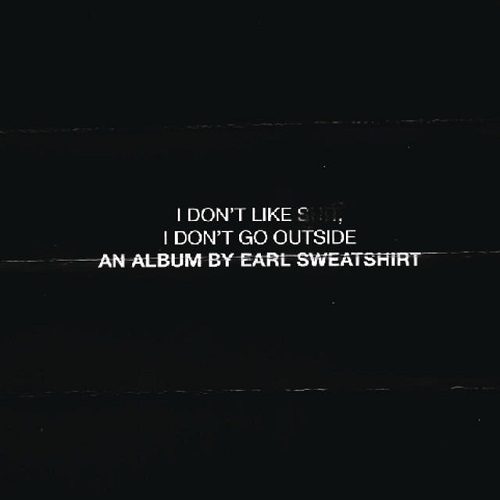Anyone who has spent a lot of time partying knows that, as much fun as it is, it is not a sustainable lifestyle. It can also be incredibly lonely. There are exceptions, but in general getting wasted with people isn’t a path to lasting friendships. Drinking and drug buddies have a tendency to disappear when the booze and drugs are gone. There is also something incredibly depressing about living what is supposed to be the high life, and realizing how empty and unsatisfying it is. Ask 20-year-old rapper Earl Sweatshirt.
The success and hype that Earl has experienced since his Odd Future crew took off and his debut album “Doris” was released has weighed on him. He spent the last three years partying too hard and not taking care of himself physically or emotionally, losing fifty pounds from not eating. He got his heart broken by so-called friends and girlfriends. He documents his experiences and subsequent disillusionment on his latest album, “I Don’t Like S#%!, I Don’t Go Outside.”
Despite it’s depressing title and heavy subject matter, “I Don’t Like S#%!” is actually a more upbeat album than “Doris.” Earl sounds more confident than on his previous release, even when he is rapping about the pitfalls of fame, his troubled upbringing, and his problems with women. The confidence shows in several ways. For one, there are less features on the album, as if Earl doesn’t feel he needs to hide behind other MCs. Also, his rapping is more energized than on “Doris.” He doesn’t sound like a bedridden depressive. On album opener “Huey,” he even seems like he’s having a good time:
“Critics pretend to get it and bitches just don’t fuck with him
I spent the day drinking and missing my grandmother
Just grab a glass and pour some cold white wine in it
A Colt 45 in it, you know how I get it
I’m toasting myself and a toast to all my niggas
And there ain’t no time limit, I’m toasted as hell
And I gotta jot it quick cause I can’t focus so well”
“Good grief, I’ve been reaping what I sowed,” Earl raps on “Grief.” There’s a lot of talk on this album about betrayal, and betrayal by women in particular. At times Earl approaches early Snoop levels of misogynistic paranoia. As he raps on “Off Top,” “What’s your motive, ho? I only trust a bitch as far as I can throw ’em.” What makes Earl’s women problems interesting is the level of genuine hurt he displays, and the fact that he owns that he is part of the problem. On “Mantra” he admits that to some level he’s to blame for his relationship problems:
“You used to say you like violins and your lifestyle depend on me
And I know it’s night time when you get lonely
And tell all your little friends how that bitch stole me
And despite all of the facts that you got phony
You gonna tell them about the night that you exposed me
For the bastard I was
And how I probably smashed every bitch that I passed in the club
And the last couple months was the worst
Cause I smashed all the trust
That I earned in the past couple months
That we had as a couple
My absence of fucks
Was a problem that we ain’t ever really get to solve
We just smashed and we scuffled
Trying to keep it calm but I snap at you
Now you’re taking all your property back and it’s obvious that
That apart from the fact that we fuck and it’s bomb
And I hate when you home
And when I’m gone I don’t call cause you nag
Man, I brought you some S#%!
And I bought you some S#%!
What you offering here?
What the fuck you offering here?”
As on “Doris,” Earl deals with some heavy S#%!: his troubled upbringing, his strained relationship with his mother and grandmother, where he belongs both on earth and in hip-hop. On “Faucet” he raps:
“And I don’t know who house to call home lately
I hope my phone break, let it ring
Toe to toe with the foes, new and old
Basic hoes try to cage him like the po’
When I run, don’t chase me”
The album is produced by Earl as RandomBlackDude, whose beats lean more towards trippy than banging. There are big, echoing drums, hints of melody, and lots of space for Earl’s raps. Some tracks go for light funk reminiscent of DOOM, while album highlight “Grief” sounds like it samples William Basinki’s “Disintegration Loops.” There is nothing on here that is going to be played at a club, but it is consistently interesting.
There are two negatives about “I Don’t Like S#%!,” only two of which Earl had much control over. For one thing, it’s short, barely clocking in at 30 minutes. The upside is that it is tight and there is zero filler, but it feels a little incomplete. Secondly, his low-key style makes this a hard album to get really excited about. He’s more energized here than on “Doris,” but it is still a downer of a record. Vince Staples guest spot on album closer “Wool” makes this all the more obvious. Staples has a charisma and punch that Earl lacks. That’s not to knock Earl as a rapper, but he does make music that is best suited for a certain mood.
Even with those criticisms, this is an excellent album. Odd Future have always been much deeper than their deliberately offensive lyrics and Jackass antics let on. Underneath the sick senses of humor were kids dealing with some serious issues. “I Don’t Like S#%!” sees Earl continuing to mature and grow as an artist. It’s nice to see him living up to the promise of his early releases, and making music that is so brutally honest.

